The Effect of Financial Education on the FinancialLiteracy of the Millennial Generation
DOI:
https://doi.org/10.62872/vn90ze66Keywords:
Financial education, financial literacy, millennial generationAbstract
This study aims to analyze the influence of financial education on the financial literacy of the millennial generation. Millennials face increasingly complex financial challenges as access to digital financial products and consumptive lifestyles increases. Good financial literacy is needed so that they are able to make wise financial decisions, save, and invest for the future. This study uses a quantitative approach by collecting data through a survey involving 121 millennial respondents who have participated in financial education programs. Data analysis was carried out using SPSS version 25 software and linear regression methods to test the relationship between financial education and financial literacy levels. The results of the study show that financial education has a significant positive influence on millennial financial literacy. These findings underscore the importance of financial education programs in improving the financial understanding of millennials so that they are better prepared to face complex financial decisions. This research is expected to be a reference for policymakers and educational institutions in designing more effective financial literacy programs to support the financial well-being of the millennial generation.
Downloads
References
Agarwal, S., & Zhang, J. (2020). FinTech, Lending and Payment Innovation: A Review. Asia-Pacific Journal of Financial Studies, 49(3), 353–367. Portico. https://doi.org/10.1111/ajfs.12294
Albart, N. (2024). The Influence of Financial Literacy, Income Level and Herding Behavior on Investment Decisions. International Journal of Economics Development Research (IJEDR), 5(2), 1344-1360.
Anatasya, P. S., Putri, A. R., Kholifah, S., Oktavia, D. T., Febriani, D. D., & Pratama, B. C. (2024). The Influence of Financial Literacy, Lifestyle, and Self-control on Student Consumptive Behavior. Asian Journal of Economics, Business and Accounting, 24(9), 135–145. https://doi.org/10.9734/ajeba/2024/v24i91482
Bayuk, J., & Altobello, S. A. (2019). Can gamification improve financial behavior? The moderating role of app expertise. International Journal of Bank Marketing, 37(4), 951–975. https://doi.org/10.1108/ijbm-04-2018-0086
Bhilawadikar, V. S., & Garg, E. (2020). Investment attitude of millennials towards cryptocurrencies. Social Business. https://doi.org/10.1362/204440820x15929907056652
Capuano, A., & Ramsay, I. (2011). What Causes Suboptimal Financial Behaviour? An Exploration of Financial Literacy, Social Influences and Behavioural Economics. SSRN Electronic Journal. https://doi.org/10.2139/ssrn.1793502
Chibba, M. (2009). Financial Inclusion, Poverty Reduction and the Millennium Development Goals. The European Journal of Development Research, 21(2), 213–230. https://doi.org/10.1057/ejdr.2008.17
Cwynar, A. (2020). Financial Literacy, Behaviour and Well-Being of Millennials in Poland Compared to Previous Generations: The Insights from Three Large-Scale Surveys. Review of Economic Perspectives, 20(3), 289–335. https://doi.org/10.2478/revecp-2020-0015
Dwiastanti, A. (2017). Analysis of financial knowledge and financial attitude on locus of control and financial management behavior. Management and Business Review, 1(1), 1. https://doi.org/10.21067/mbr.v1i1.2043
Friedline, T., & West, S. (2020). Financial Education is not Enough: Millennials May Need Financial Capability to Demonstrate Healthier Financial Behaviors. Journal of Family and Economic Issues, 37(4), 649–671. https://doi.org/10.1007/s10834-015-9475-y
Hastings, J. S., Madrian, B. C., & Skimmyhorn, W. L. (2013). Financial Literacy, Financial Education, and Economic Outcomes. Annual Review of Economics, 5(1), 347–373. https://doi.org/10.1146/annurev-economics-082312-125807
Irving, K. (2021). The Financial Life Well-Lived: Psychological Benefits of Financial Planning. SSRN Electronic Journal. https://doi.org/10.2139/ssrn.1927110
Kim, K. T., Anderson, S. G., & Seay, M. C. (2018). Financial Knowledge and Short-Term and Long-Term Financial Behaviors of Millennials in the United States. Journal of Family and Economic Issues, 40(2), 194–208. https://doi.org/10.1007/s10834-018-9595-2
Kurz, C. J., Li, G., & Vine, D. J. (2019). Are millennials different? Handbook of US Consumer Economics, 193–232. https://doi.org/10.1016/b978-0-12-813524-2.00008-1
Liu, S., Gao, L., Latif, K., Dar, A. A., Zia-UR-Rehman, M., & Baig, S. A. (2021). The Behavioral Role of Digital Economy Adaptation in Sustainable Financial Literacy and Financial Inclusion. Frontiers in Psychology, 12. https://doi.org/10.3389/fpsyg.2021.742118
Lusardi, A., & Mitchelli, O. S. (2017). Financial Literacy and Retirement Preparedness: Evidence and Implications for Financial Education. Business Economics, 42(1), 35–44. https://doi.org/10.2145/20070104
Mohammed Esmail Alekam, J., Salniza Bt Md. Salleh, M., & Sanuri bin Mohd. Mokhtar, S. (2018). The Effect of Family, Peer, Behavior, Saving and Spending Behavior on Financial Literacy among Young Generations. International Journal of Organizational Leadership, 7(3), 309–323. https://doi.org/10.33844/ijol.2018.60258
Normawati, R., Rahayu, S., & Worokinasih, S. (2021). Financial Knowledge, Digital Financial Knowledge, Financial Attitude, Financial Behaviour and Financial Satisfaction on Millennials. Proceedings of the 1st International Conference on Law, Social Science, Economics, and Education, ICLSSEE 2021, March 6th 2021, Jakarta, Indonesia. https://doi.org/10.4108/eai.6-3-2021.2305967
Pamella, C. D. (2022). THE EFFECT OF FINANCIAL LITERACY, FINANCIAL ATTITUDE, LOCUS OF CONTROL AND INCOME ON FINANCIAL MANAGEMENT BEHAVIOR ON THE MILLENNIAL GENERATION. JOURNAL OF APPLIED MANAGERIAL ACCOUNTING, 6(2), 241–253. https://doi.org/10.30871/jama.v6i2.4361
Pertiwi, T. K., & Purwanto, E. (2021). ANALYSIS OF ADOPTING MILLENNIAL GENERATION FINANCIAL TECHNOLOGY (FINTECH) SERVICES. International Journal of Business Management and Economic Review, 04(03). https://doi.org/10.35409/ijbmer.2021.3257
REMUND, D. L. (2020). Financial Literacy Explicated: The Case for a Clearer Definition in an Increasingly Complex Economy. Journal of Consumer Affairs, 44(2), 276–295. Portico. https://doi.org/10.1111/j.1745-6606.2010.01169.x
Sirajuddin, T. (2020, February). Rural development strategies in Indonesia: Managing villages to achieve sustainable development. In IOP Conference Series: Earth and Environmental Science (Vol. 447, No. 1, p. 012066). IOP Publishing. https://doi.org/10.1088/1755-1315/447/1/012066
Yathiraju, N., & Dash, B. (2023). Big Data and Metaverse Revolutionizing the Futuristic Fintech Industry. International Journal of Computer Science and Information Technology, 15(1), 01–13. https://doi.org/10.5121/ijcsit.2023.15101
Downloads
Published
Issue
Section
License
Copyright (c) 2024 Mohamad Choirul Anwar, Arizqiya Nurfattah, Achmad Maqsudi (Author)

This work is licensed under a Creative Commons Attribution-ShareAlike 4.0 International License.












